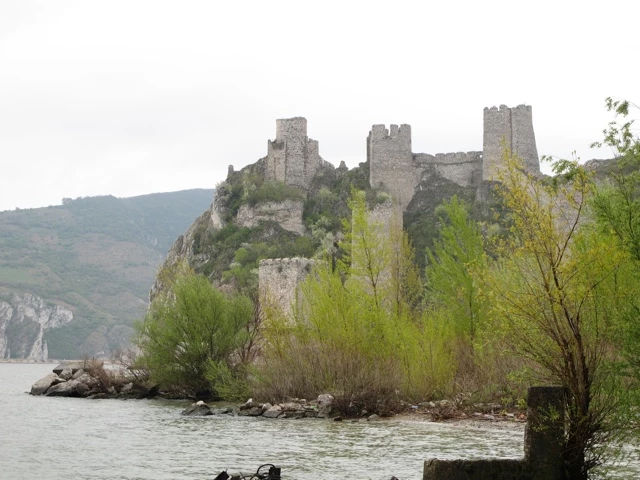Drum Bun Dunārea
Tuesday, April 19, 2011
- Silkroad
After 2180 kilometers of the Danube we left today in Zimnicea Romania and at the same time said goodbye to the beautiful river.
The trip from Belgrade to here to Svistov in Bulgaria was for me the most exciting part of the whole trip so far. Shortly before Kostolac in Serbia, a thunderstorm front approached us. Right next to the road was a gas station. The staff gave us a coffee right away.

Both the city and the castle were built by the Hungarians in the 13th century. After 1389 it fell into Turkish hands and then changed hands often. In 1815 it finally came under Serbian rule. The 64,000-hectare Derdap National Park stretches out from the ruins of Golubac. At Gospodin Vir the Danube is just 150 meters wide and 82 meters deep. This is the largest depth of a river in the world. Nearby, at Dubova on the Romanian side, stands the monumental "Decebalus Rex".
It was built in memory of the last king of Dacia (87- 106 AD) and is 40m high and 25m wide. 20 kilometers further came the Iron Gate, our customs to get to Romania. From 1962 to 1974, the Djerdap dam was built with its huge dimensions and the large power plant jointly by Yugoslavia and Romania. The total cost was $ 550 million. At its base, the dam is 448 meters wide and at the top more than 1200 meters. It juts out over 30 meters from the Danube and dams back 150 kilometers. The hydropower plant produces more than 10.5 trillion kilowatts of electricity. The construction of this dam has raised the Danube's water level by around 35 meters.
The next morning we got to know Romania for the first time. On Sunday morning we wanted to buy bread in Crivina. The baker, Stefan Gicā, spoke to me in Italian. He still has a bar in the village and invited us for a cappuccino. He then gave us a bottle of red wine with fish and paella for the celebration of the day.

He was also able to teach us a few Romanian words. With a bottle of red wine in the stomach, it is much easier in the day and in the warm weather, the alcohol evaporated quickly. Life happens almost exclusively on the street. I feel a bit like "Asterix & Obelix". Romania is a country of endless vastness and exclusively characterized by agriculture and livestock. We have met a lot of horse-drawn vehicles.

In each village people wave to us. As soon as we stop somewhere we are surrounded. You almost feel like a cyclist at the Tour de France. Wild camping is almost necessary here. There are almost no campsites in this country. For that you can put your tent everywhere. Also with the dogs we have become friends.
Pretty nice was also the second evening: when we had set up our tents, Petre Sarcea came over. He owns the land on which we pitched our tent. Spontaneously he brought us wine and bread.
As a farmer, he earns the same amount each year as a farmer receives from us in Switzerland in one month. Of this he has to give 55% as taxes to the state. The only negative experience in Romania we had in Corabia. After shopping in a supermarket, a couple of gypsy children stole a chocolate drink. In 1407 there is the first written record of Gypsies, in the Holy Roman Empire they were considered pilgrims, traveled under the protection of imperial privileges and lived on the alms of the population. But by the middle of the 15th century they were driven out of the cities and even declared outlawed at the end of the same century. The Gypsies, like other wandering professionals such as showmen, quaksalvers, minstrels, etc. referred to as "driving people".
The ferry went from Zimnicea to Bulgaria.
Now it is still 550 kilometers to Istanbul. Hopefully it will be just as nice as in Romania ...